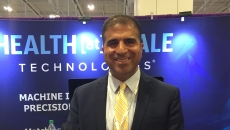Bill Siwicki
With approximately 200 active peer reviewers at the health system, this significant transition has improved physician engagement and the overall process – and saved scores of hours per coordinator.
Dr. Mohammed Saeed from the University of Michigan Medical School discusses how the artificial intelligence tools can help improve provider practice patterns, potentially shielding patients from the harms of inappropriate or unnecessary care.
The CEO of Amwell, Cleveland Clinic's partner in the telehealth initiative, discusses how the organizations are expanding their virtual care and remote patient monitoring efforts and where they see telemedicine in five years.
By having deep conversations about artificial intelligence's capabilities and limitations, the nine-state health system hopes to help its clinical and IT leaders enable a more responsible path forward for AI deployments.
Health systems able to offer this will not only be better positioned to survive external pressures, says one artificial intelligence expert, but will also help set the bar for critical best practices for future patient-provider relationships.
Remote patient monitoring has helped the health system boost patient engagement, improve patient care quality through evidence-based therapies and reduce clinicians' workloads.
Dhruv Suyamprakasam, leader of a virtual healthcare company, discusses why he believes ChatGPT enhances productivity for providers of virtual and in-person care.
Data integrity and model validity are also must-haves, says an expert, who offers his ideas on a "clean data" mentality and explains why explicit consent is essential for training algorithms.
CCA prioritizes virtual care because access to technology is a social factor that impacts health – and it enhances care coordination by engaging members where they are.
The New York hospital's vice chairman of urology and robotics operations explains how a new surgical intelligence platform digs into surgery video to help understand outcomes and improve care.










